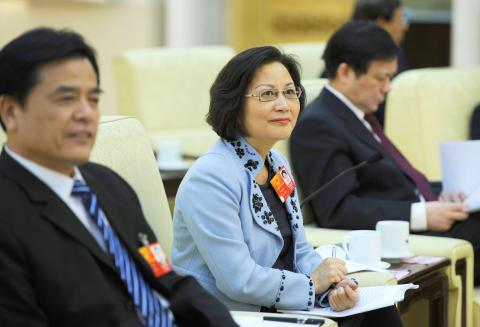Justin Lin (林毅夫), who defected to China in 1979 and currently works as a vice president at the World Bank, would be arrested and face charges of treason if he came back to Taiwan, the Ministry of National Defense (MND) said yesterday.
At a legislative meeting on March 7, Chinese Nationalist Party (KMT) Legislator Chang Ching-chung (張慶忠) urged the government to allow Lin to return to Taiwan on humanitarian grounds. Mainland Affairs Council Minister Lai Shin-yuan (賴幸媛) said at the time that while the council did not oppose Taiwanese who have lived in China for a long period of time returning to the country to visit family, Lin’s case was a military matter and the council respected the ministry’s position.
Lin’s wife, Chen Yun-ying (陳雲英), said in Beijing on Saturday that Lin was scheduled to leave his post at the World Bank in June and his greatest wish after retirement was to come back to Taiwan.

Photo: Liu Jin, AFP
Chen, who serves as a member of China’s National People’s Congress, said she and her husband had long dreamed of returning to Taiwan.
Minister of National Defense Kao Hua-chu (高華柱) told the legislature’s Foreign Affairs and National Defense Committee meeting yesterday that Lin had committed treason under military law and was “still committing the crime.”
Lin would be arrested immediately and face military prosecution upon entering Taiwan, Kao added.
Lin defected to China in 1979 when he was serving as an army captain on the outlying island of Kinmen. After serving as an economist in Beijing, he became a vice president and chief economist at the World Bank.
In May 2002, Lin filed an application from Beijing to return to Taiwan to attend his father’s funeral. Taiwanese authorities approved his application, but warned that he could face legal consequences if he returned. Lin decided not to risk detention and did not attend his father’s funeral.
Lin’s defection would be subject to a death sentence, life sentence or imprisonment for more than 10 years according to the Criminal Code of the Armed Forces, Taiwan Solidarity Union (TSU) caucus whip Hsu Chung-hsin (許忠信) said.
Hsu said the ministry listed the former company commander as “missing” in 1979 when he defected and paid his family compensation of NT$470,000.
Lin’s family never returned the compensation and his case was not classified as a defection until Nov. 8, 2002, by the Military High Court, Hsu said. That means the 30-year statute of limitation on his case has not expired.
Allowing the Lin family to return would be seen as support for China’s “united front” strategy and caving in to pressure from Beijing in the guise of a “humanitarian” cause, TSU Legislator Huang Wen-ling (黃文玲) said.
The ministry tried to have Lin extradited after Taiwan and China signed an agreement on judicial assistance, but the request was rejected by Beijing, Democratic Progressive Party Legislator Hsueh Ling (薛凌) said.
China blatantly rejected Taiwan’s request to extradite four defectors: Lin, former army Lieutenant Wang Yi-hung (王宜宏) and two fighter pilots, Huang Chih-cheng (黃植誠) and Lin Hsien-shun (林賢順), Hsueh said.
Hsueh added that the ministry was suspected of a cover-up in Lin’s case, as it had initially assessed that the case was a defection.

DEFENSE: The National Security Bureau promised to expand communication and intelligence cooperation with global partners and enhance its strategic analytical skills China has not only increased military exercises and “gray zone” tactics against Taiwan this year, but also continues to recruit military personnel for espionage, the National Security Bureau (NSB) said yesterday in a report to the Legislative Yuan. The bureau submitted the report ahead of NSB Director-General Tsai Ming-yen’s (蔡明彥) appearance before the Foreign and National Defense Committee today. Last year, the Chinese People’s Liberation Army (PLA) conducted “Joint Sword-2024A and B” military exercises targeting Taiwan and carried out 40 combat readiness patrols, the bureau said. In addition, Chinese military aircraft entered Taiwan’s airspace 3,070 times last year, up about

A magnitude 4.3 earthquake struck eastern Taiwan's Hualien County at 8:31am today, according to the Central Weather Administration (CWA). The epicenter of the temblor was located in Hualien County, about 70.3 kilometers south southwest of Hualien County Hall, at a depth of 23.2km, according to the administration. There were no immediate reports of damage resulting from the quake. The earthquake's intensity, which gauges the actual effect of a temblor, was highest in Taitung County, where it measured 3 on Taiwan's 7-tier intensity scale. The quake also measured an intensity of 2 in Hualien and Nantou counties, the CWA said.

The Overseas Community Affairs Council (OCAC) yesterday announced a fundraising campaign to support survivors of the magnitude 7.7 earthquake that struck Myanmar on March 28, with two prayer events scheduled in Taipei and Taichung later this week. “While initial rescue operations have concluded [in Myanmar], many survivors are now facing increasingly difficult living conditions,” OCAC Minister Hsu Chia-ching (徐佳青) told a news conference in Taipei. The fundraising campaign, which runs through May 31, is focused on supporting the reconstruction of damaged overseas compatriot schools, assisting students from Myanmar in Taiwan, and providing essential items, such as drinking water, food and medical supplies,

New Party Deputy Secretary-General You Chih-pin (游智彬) this morning went to the National Immigration Agency (NIA) to “turn himself in” after being notified that he had failed to provide proof of having renounced his Chinese household registration. He was one of more than 10,000 naturalized Taiwanese citizens from China who were informed by the NIA that their Taiwanese citizenship might be revoked if they fail to provide the proof in three months, people familiar with the matter said. You said he has proof that he had renounced his Chinese household registration and demanded the NIA provide proof that he still had Chinese